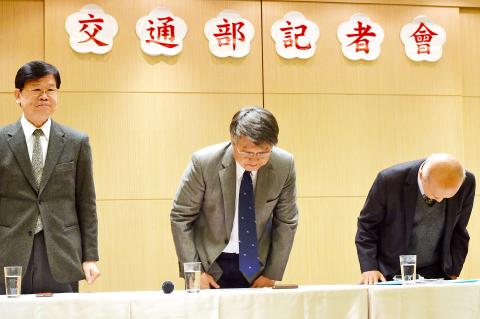Ministry of Transportation and Communications (MOTC) officials yesterday apologized for delays to the MRT system’s connection to Taiwan Taoyuan International Airport that set the project completion date back by six months.
Bowing at a news conference, Deputy Minister of Transportation and Commuications Tseng Dar-jen (曾大仁), Bureau of High Speed Rail Director-General Allen Hu (胡湘麟) and bureau chief engineer Chung Wei-li (鍾維力) apologized, saying that the launch date for the airport MRT line would be delayed.
It was the sixth delay since the project was announced in 2002. The project is to connect the airport directly to the MRT’s Taipei Main Station, stopping at Jhongli Township (中壢) and the Taoyuan High Speed Rail Station.

Photo: Lo Pei-der, Taipei Times
The MRT line is still undergoing trial runs and the primary reason for its delay is six of the 46 test items failing to meet contract standards, Hu told the news conference.
According to the contract, terminal-to-terminal MRT trains must travel at an average speed of 60kph, while trains that stop at each station must travel at an average speed of 45kph.
The trains currently travel at 57km and 42km per hour respectively, Hu said.
The speed has affected the expected time of arrival of trains on one-way trips, which was set at 35 minutes from Taipei Main Station to Taoyuan airport, the ministry said, adding that the line took 36 to 37 minutes to make a single one-way trip.
The time between trains, standing at three minutes and 15 seconds, does not meet the three minutes stated in the contract, Hu said.
While the bureau constructed the line, Taoyuan Metro Corp was expected to handle the line’s operations, the ministry said, adding that both sides were at odds on how to conduct simulated service and trial runs.
The bureau wanted Taoyuan Metro Corp to allocate more personnel for the trial runs in the hopes of becoming more familiar with the system, the ministry said, adding that the company was adamant that it would start simulated services only after all of the trial runs meet contract standards.
The ministry said that if all goes according to plan, the line could start operating at the end of the year, but due to previous letdowns it was not going to set a date for the commencement of services.

Taiwan is to commence mass production of the Tien Kung (天弓, “Sky Bow”) III, IV and V missiles by the second quarter of this year if the legislature approves the government’s NT$1.25 trillion (US$39.78 billion) special defense budget, an official said yesterday. Commenting on condition of anonymity, a defense official with knowledge of the matter said that the advanced systems are expected to provide crucial capabilities against ballistic and cruise missiles for the proposed “T-Dome,” an advanced, multi-layered air defense network. The Tien Kung III is an air defense missile with a maximum interception altitude of 35km. The Tien Kung IV and V

The disruption of 941 flights in and out of Taiwan due to China’s large-scale military exercises was no accident, but rather the result of a “quasi-blockade” used to simulate creating the air and sea routes needed for an amphibious landing, a military expert said. The disruptions occurred on Tuesday and lasted about 10 hours as China conducted live-fire drills in the Taiwan Strait. The Civil Aviation Administration (CAA) said the exercises affected 857 international flights and 84 domestic flights, affecting more than 100,000 travelers. Su Tzu-yun (蘇紫雲), a research fellow at the government-sponsored Institute for National Defense and Security Research, said the air

A strong continental cold air mass is to bring pollutants to Taiwan from tomorrow, the Ministry of Environment said today, as it issued an “orange” air quality alert for most of the country. All of Taiwan except for Hualien and Taitung counties is to be under an “orange” air quality alert tomorrow, indicating air quality that is unhealthy for sensitive groups. In China, areas from Shandong to Shanghai have been enveloped in haze since Saturday, the ministry said in a news release. Yesterday, hourly concentrations of PM2.5 in these areas ranged from 65 to 160 micrograms per cubic meter (mg/m³), and pollutants were

Taiwan lacks effective and cost-efficient armaments to intercept rockets, making the planned “T-Dome” interception system necessary, two experts said on Tuesday. The concerns were raised after China’s military fired two waves of rockets during live-fire drills around Taiwan on Tuesday, part of two-day exercises code-named “Justice Mission 2025.” The first wave involved 17 rockets launched at 9am from Pingtan in China’s Fujian Province, according to Lieutenant General Hsieh Jih-sheng (謝日升) of the Office of the Deputy Chief of the General Staff for Intelligence at the Ministry of National Defense. Those rockets landed 70 nautical miles (129.6km) northeast of Keelung without flying over Taiwan,